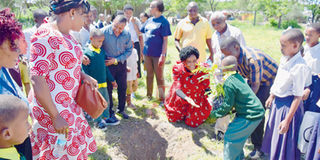Autism: Mental disorder with no specific cause

Tree planting event to mark the World Autism Awareness Day held recently at Mto-wa-Mbu. The event was hosted by Pambazuka Tanzania, a non-governmental organisation, running a day care centre for children with the plight of autism. PHOTOP | ZEPHANIA UBWANI
What you need to know:
- A closer look would establish that they were not ordinary children. Reading from their facial appearances, they had abnormal behaviour.
Arusha. At the entrance of a classroom at Kigongoni Primary School one comes face-to-face with a dancing troupe of pupils. That was a gesture of welcoming guests from as far as Arusha and those from within the Mto-wa-Mbu community, a sprawling township below the Rift Valley escarpment in Monduli district.
A closer look would establish that they were not ordinary children. Reading from their facial appearances, they had abnormal behaviour.
As they greet the audience and take to the floor, it was easy to note clear signs of mental impairment on their faces.
The kids were performing during the International Autism Awareness Day, officially marked on April 2 each year, but this time around it was pushed back to April 10.
They are victims of autism, a mental impairment characterised by poor social interaction and communication as well as restricted and repetitive behaviour.
Ms Grace Anna Lyimo, the director of Connects Autism Tanzania, a non-governmental organisation that supports people living with autism, maintains that it should not be seen as a disease and not a brain disorder. “It is a developmental disability in children by the age of three. It impacts the child’s ability to communicate and interact with others in society,” she said.
She said although there was no cause for concern for the impairment does not lead to instant death as is the case with other diseases, experts are still baffled by its cause.
“There is no single cause identified for this disability, making it even more challenging to address in a developing country like Tanzania,” she told The Citizen. Experts say autism affects information processing in the brain by altering how nerve cells and their synapses connect and organise, but how this occurs is still a mystery.
Globally, autism is estimated to affect 24.8 million people as of 2015. In the 2000s, the number of people affected was estimated at a ratio of one to two per 1,000. About a third to a half of individuals with autism do not develop enough natural speech to meet their daily communication needs.
Boys are affected by four to five times as compared to girls. UN statistics indicate one in every 68 children could have symptoms associated with the disorder. While the anomaly is highly heritable, researchers suspect both environmental and genetic factors to be the other causes.
In the developing countries it has increasingly been associated with birth defects.
Charity organisations such as Connects Autism Tanzania (CAT) are all out to support the affected children through special learning tools, but challenges are abound and one of them is prejudice.
“Stigma and prejudice against children suffering from disabilities is high in Arusha and Manyara regions. Parents would often hide or abandon them,” said Ms Anna Sospeter, a child rights activist.
She works with Pambazuka Tanzania, an NGO hosting autistic kids at Mto-wa-Mbu.
”As we speak, some parents continue to hide their children suffering from the ailment,” she said. Worse enough, she said men usually abandon their families, leaving the burden to women, once they learn that their children suffer from autism or similar impairments. She, like other officials of the NGO, insisted that children suffering from autism, were ordinary kids only that they needed support in overcoming the disability. As is the case with Arusha and Manyara, the situation is equally worrying in Kilimanjaro region where CAT has been involved in various supportive programmes to the affected kids.
“Parents with such impaired children should not be despaired but instead take them to the child care centres,” said a special education officer with the Moshi Municipality Joyce Saua.
She added during a recent event; “ If educated and well cared, they can undertake some income generating jobs .”




